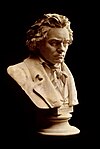Egmont (Beethoven)

Egmont,
Beethoven wrote it between October 1809 and June 1810, and it was premiered on 15 June 1810.[2]
The subject of the music and dramatic narrative is the life and heroism of 16th-century nobleman
Beethoven composed Klärchen's songs "Die Trommel gerühret" ("The drum is a-stirring") and "Freudvoll und leidvoll" ("Joyful and woeful") with
The overture is powerful and expressive, one of the last works of Beethoven's middle period. It has become as famous a composition as the Coriolan Overture and is in a style similar to the Fifth Symphony, which he had completed two years earlier.
Outline of sections
The incidental music comprises the following sections, among which the overture, the lieder Die Trommel gerühret, Freudvoll und leidvoll and Klärchens Tod are particularly well-known:[7]
- Overture: Sostenuto, ma non troppo – Allegro
- Lied: "Die Trommel gerühret"
- Entracte: Andante
- Entracte: Larghetto
- Lied: "Freudvoll und leidvoll"
- Entracte: Allegro – Marcia
- Entracte: Poco sostenuto e risoluto
- Klärchens Tod
- Melodram: "Süßer Schlaf"
- Siegessymphonie (symphony of victory): Allegro con brio
Cultural influences
The Hungarian film Overture by János Vadász, which won the 1965 Cannes Film Festival's Short Film Palme d'Or, uses the complete Egmont Overture as the soundtrack for a series of images featuring a hatching bird and was described as "among the most ingenious pairings of music and image in the history of the festival."[8]
References
- ^ Wigmore, Richard. "A meeting of genius: Beethoven and Goethe, July 1812". Gramophone. Haymarket. Retrieved 6 July 2012.
- ^ Chicago Symphony Orchestra. Ludwig van Beethoven. Egmont, Op. 84. Program Notes Archived 29 January 2021 at the Wayback Machine by Phillip Huscher
- ^ Why did Beethoven's Egmont Overture Become the "Hymn of the Revolution"? Archived 6 December 2022 at the Wayback Machine By Zsófia Nagy-Vargha. hungarytoday.hu, 23 October 2020.
- ^ Where gunfire transformed a protest into a revolution. By hu:Tóth Eszter ZsófiaEszter Zsófia Tóth. freedomfirst1956.com
- ^ Speech by H.E. Ambassador Katalin Bogyay on the occasion of the commemoration of the 23 October, 1956 Revolution. Permanent Mission of Hungary. United Nations. New York.
- ^ Beethoven aus der Sicht seiner Zeitgenossen, edited by Klaus Martin Kopitz and Rainer Cadenbach, Munich 2009, Vol. 1, pp. 3–5
- ^ RUSSELL, Peter; Delphi Masterworks of Ludwig van Beethoven (Illustrated). Hastings, UK: Delphi Classics, 2017.
- ^ Overture (1965) mymoviepicker.com
External links
- Beethoven: Egmont Overture on YouTube
- Egmont: Scores at the International Music Score Library Project


